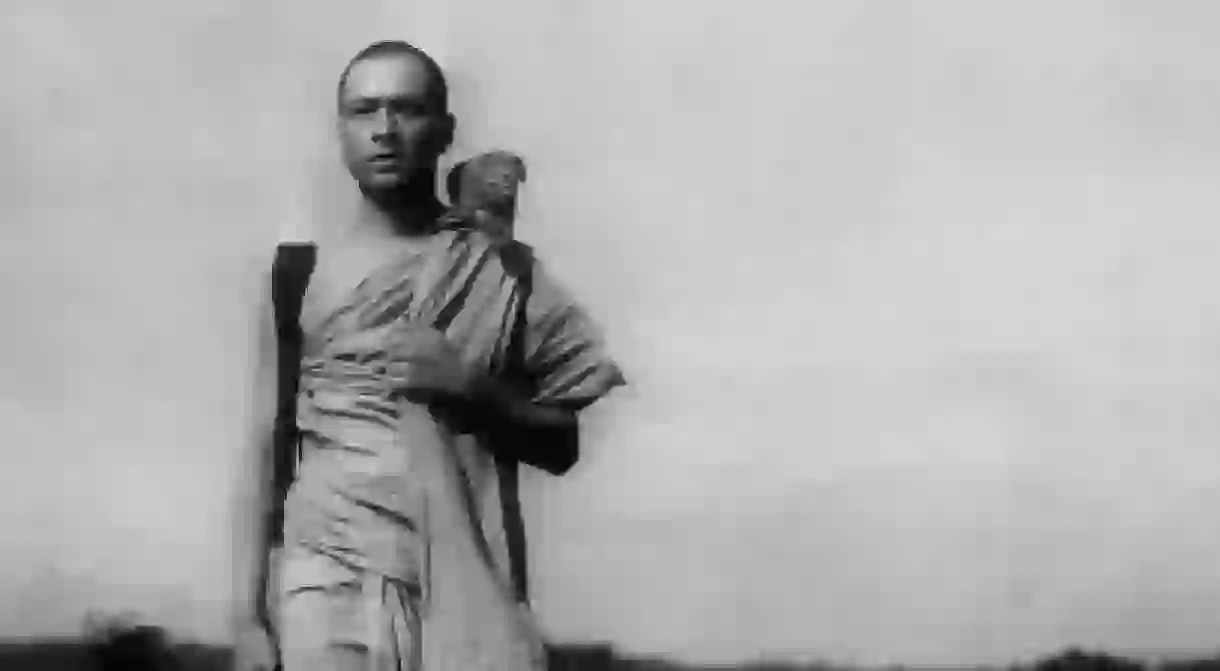Kon Ichikawa’s 'The Burmese Harp': A Search for Redemption

Kon Ichikawa’s 1956 film The Burmese Harp is one of the few Japanese films to focus so directly and so critically on the country’s military exploits in World War II. It is simultaneously an excoriating attack on the militaristic ideology which forced thousands of Japanese soldiers to die in vain, and a study in redemption which questions whether wartime atrocities can ever be forgiven or forgotten. Thomas Storey explores how this master of film create such an affecting piece of cinema.
The Burmese Harp begins with a battalion of Japanese soldiers trekking through the tropical wilderness, having been forced to retreat deep into the Burmese jungle. It immediately emphasises the innocence and naivety of this rag tag group, who seem largely oblivious to the militaristic ethos of their leaders, and dream only of home. Their only indulgence as they struggle through the thick Burmese jungle is in song, as they are led by Captain Inōye, a former choirmaster, and are accompanied by Private Mizushima, who has learnt to play the Burmese Harp during his time in the country. This dedication to the songs of their homeland is touching and acts as a sign of their unsuitability for the military action with which they are entrusted.
Their love of song and the redemptive power of music is central to Ichikawa’s film. This focus leads to an incredible sequence in which the Japanese forces, realising they are surrounded by the British army, must continue singing to trick the surrounding soldiers into believing that they are unaware of their presence. Upon hearing their song, the British reply with one of their own, eventually combining in a beautifully mournful ode to their respective homelands, for they are seemingly irrevocably separated.
Following this surreal and sorrowful duet, the Japanese learn of their country’s surrender and the battalion itself surrenders before being sent to a prisoner of war camp, where they must wait until they can be sent back to Japan. However Private Mizushima is entrusted with one last mission: to persuade an entrenched band of Japanese soldiers who are holding out against the British that they must give up their fight and surrender. This battalion, unlike Mizushima’s, embodies the kamikaze militarism of the Japanese leadership, and prefers death to surrender. They reject Mizushima’s pleas, believing that by dying honourably they will do their service to their homeland. They are inevitably killed and Mizushima is left bereft and alone, blaming himself for their death whilst wandering the Burmese landscape in search of the prisoner of war camp and his comrades.
It is here that the film reaches its pinnacle as Ichikawa’s lyrical direction, the beauty of the Burmese background and the existential despair of Mizushima combine to devastating effect. Everywhere he goes, he encounters his comrades’ corpses and is forced to reflect on his guilt. His profound impasse reaches a zenith as he attempts to bury some of his former comrades in a mass grave, and is assisted by some local Burmese, who are themselves the victims of the Japanese aggression in his country. He finds shelter in a Buddhist temple, and his adoption of a monk’s robes makes many believe he is a wandering disciple, something that his taciturn and mysterious character does not contradict.
Mizushima arrives at the prisoner of war camp but is not immediately recognised by his comrades, and in fact resists their curiosity. The rest of the film is largely devoted to their attempt to find out if this mysterious monk is in fact Mizushima, and if so, whether he will return to Japan with them. His stout refusal and his newly discovered devoutness symbolise the necessity of coming to terms with the past, with mourning those that have died and dealing with the guilt of transgressors. Ichikawa’s film thus subtly and lyrically makes its pacifist message felt. His film emphasises harmony, understanding and reconciliation as necessary precepts of redemption, and this deeply humanistic film remains potent because of this universal message, which is presented with such stunning lyrical beauty.
The film was made during the peak years of Japanese cinema, during which time directors like Yasujiro Ozu and Akira Kuroswawa were offering era defining masterpieces of film. Ichikawa was at the forefront of this cinematic renaissance in Japan, but was simultaneously removed from the exploits of these directors, preferring to explore a perhaps darker terrain which led him to create anti-war films like Fires on the Plain and The Burmese Harp. He is remembered for the potency of his vision in those films, and his bravery in confronting the ghosts of his own nation’s past.













